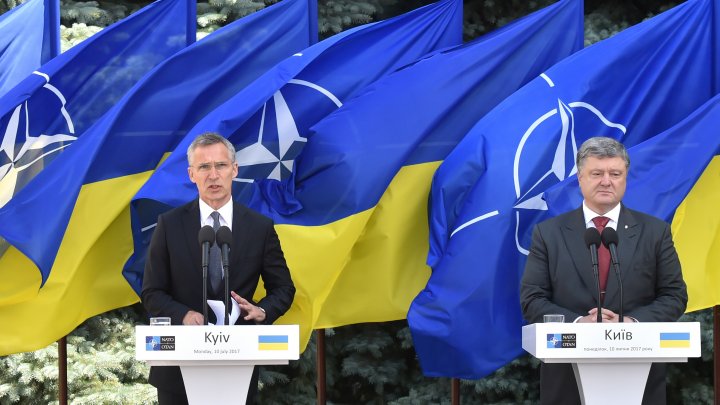President of Ukraine Petro Poroshenko on Wednesday, March 28, signed a decree “On approval of the Annual National Program under the auspices of the Ukraine-NATO Commission for 2018”.
One of the main objectives of the Strategy is to coordinate the preparations for Ukraine to obtain NATO membership, the presidential press service reports. (Source: ZN UA)
Сomment:
Earlier, on 21 March, the press service of the Presidential Administration of Ukraine conveyed the words said by P. Poroshenko in an interview to the German Hamburger Abendblatt (English: Hamburg Evening Newspaper):
“We are working on the NATO membership with particular perseverance. Our goal is to become a member of the Alliance in the next 10 years.”
Undoubtedly, these statements of the President of Ukraine should be considered in the context of the recent tensions in the relations between the Russian Federation and Western countries.
On 1 March, 2018 the Russian president dedicated his annual Message to the Federal Assembly to the threats addressed to the West, in the form of transferring the dubious achievements of the Russian scientists in the sphere of the invention of the new types of weapons. The Russian leadership has not allowed itself this kind of bravado for the past 2 years.
On 4 March, there was an incident in English Salisbury – an attempt to poison the former GRU officer, a double agent of Sergei Skripal and his daughter with the nerve agent. This was the reason for the mutual expulsion of the diplomats from the Russian Federation and a number of Western countries, including Ukraine.
The news about a new round of escalation of relations between the Russian Federation and the West comes every day. For example, in the European Union, against the backdrop of worsening relations with Russia, they decided to check the suitability of bridges, roads and railways for the transport of tanks and other heavy equipment, DW reports referring to the plan of the European Commission presented on Wednesday, March 28.
Speaking about the reasons of this escalation, we should say the following:
Judging by everything, Putin’s hopes for normalizing relations with the West and, in the first place, with America, have completely disappeared. The reliance on the assistance that Putin provided to the US and Syria, the hopes for a new US administration in the person of Trump, as well as the wait-and-see policy in relation to Europe, when the Russian Federation considered that the harm caused by the sanctions to the countries of the European Union would sooner or later make them compliant, was not justified.
The political situation inside and outside of Russia once again actualized for Putin the need for an external enemy in the face of the West, led by America. The resumption of the confrontation by the Russian Federation naturally led to reciprocal measures from the US and Europe. And it is in this context that we should consider the activation of Ukraine’s North Atlantic aspirations in the form of the signing of the aforementioned decree by the President of Ukraine P. Poroshenko.
As for Ukraine, it should be noted here that membership in NATO will not provide anything useful for the Ukrainian people. After all, for Ukraine the nature of the so-called “international collective security” or “international security guarantees” was clearly revealed in the spring of 2014 on the example of the Russian invasion in Ukraine, when one of the guarantors of the “Budapest Memorandum” became an aggressor that annexed and occupied the part of the southeast of Ukraine, and the other so-called “guarantors” tacitly agreed with this because of the concerns for their own interests and security, expressing only a hypocritical “concern.”
“Collective security”, and with it the so called “international law” is nothing more than a myth, because each state pursues exclusively its own national interests, where all international mechanisms are used only as a tool for their implementation. This is the today’s position of the weak people. All of them, including Ukraine, are hostages to the greed of superpowers, where they are forced to rely on other superpowers to escape the crimes of one of them, while, from the point of view of the crimes against small nations, they all are equal – stand on the same level.
Fazil Amzaev
Head of the Media Office of Hizb ut Tahrir in Ukraine

